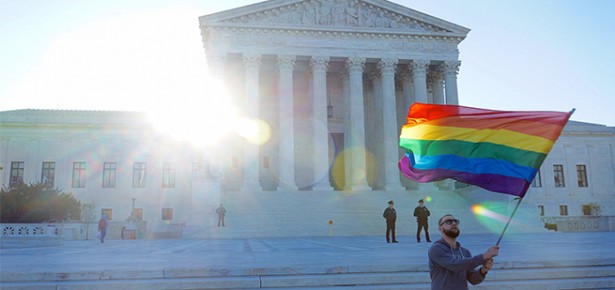
As we approach the 2016 election most of the attention has focused on the Presidential race. Yet, Congressional and state contests could have a huge impact on the future of religious freedom and sexual freedom. In Freedom’s Edge: Religious Freedom, Sexual Freedom, and the Future of America (2016), I argue that religious freedom, LGBT rights, and reproductive freedom can all be protected if we stop viewing religious freedom and sexual freedom as inherently in conflict. There are some questions on which these freedoms conflict, but if we approach the broader freedoms in a more empathetic and common sense manner we can resolve these conflicts without sacrificing one right or the other. Still, culture warriors on each side are playing a game of brinkmanship that could end up destroying one freedom or the other entirely.
Religious freedom and sexual freedom both go to the core of what it means to be a human being. Each side has a tendency to overlook the centrality that religion or sexual identity play in a person’s existence. This is ironic because sexual freedom and religious freedom can be viewed as sitting in similar positions on a continuum of freedom since each goes to the core of being, even if that fact is uncomfortable for some people on each side. If we lose one or the other we lose part of what it means to be a free and tolerant society.
Whether effective anti discrimination laws protecting the LGBT community and religious freedom laws protecting people of faith can be passed, and what will happen to those laws already passed, is a question that falls directly on Congress and state governments. While the President would have a role in setting the tone and eventually signing or vetoing any federal legislation, the role of the President on these issues is far less important than in other areas. In this regard, the intolerant tone set by Donald Trump could have some negative impact on building common ground, but neither Presidential candidate has made these issues a central focus of the campaign.
In the end, the key is electing legislators at the state and federal levels who are willing to communicate and reach across party and culture war lines in order to maximize the benefits for both sides. In Freedom’s Edge, I advocate strong anti discrimination legislation to protect members of the LGBT community and strong RFRAs (Religious Freedom Restoration Acts) to protect religious entities and individuals. Yet, I argue that SCOTUS’s decision in Hobby Lobby was a disaster for religious freedom because protecting for-profit entities’ religious freedom has fueled much of the attack on religious freedom more generally. Amending RFRAs to exclude protection for for-profit entities, except perhaps sole proprietorships in very limited circumstances, while maximizing protection for religious entities and individuals would help protect religious freedom in the long-run. Passing strong anti-discrimination laws with an exemption for traditional religious entities would achieve some of the same results as amending RFRAs to exclude for-profits. This is because anti discrimination laws provide a compelling interest that would allow victims of discrimination to take action against for-profit entities that discriminate.
Unfortunately, the current Congressional leadership has been remarkably ineffective at compromising on almost anything, including culture war issues. Moreover, as demonstrated by recent legislation in Mississippi which was supposedly designed to promote religious freedom, but which in reality was targeted at LGBT rights and went far beyond even the broadest RFRAs, some state legislatures will try to promote (or pander to) one side of the issue, even to the point where they hurt that side nationally. Attempts to get legislatures to repeal traditional state RFRAs are the other side of this coin. So far these attempts have been unsuccessful, but as the defeat of several state RFRA bills demonstrates, the forces arraying against religious freedom are just as capable of reactionary and all-or-nothing tactics as their opponents.
Utah remains an example of what can happen when people of good faith on both sides are willing to compromise to protect both religious freedom and LGBT rights. The “Utah Compromise” provides protections for the LGBT community and the faith community. Is it perfect? Of course not. And people on both sides have complained it goes too far or not far enough. Yet, it provides proof of concept. Let’s hope that in November legislators are elected who can see the long term benefits of compromise. But given recent political trends I wouldn’t hold my breath.
Latest Comments
Have your say!